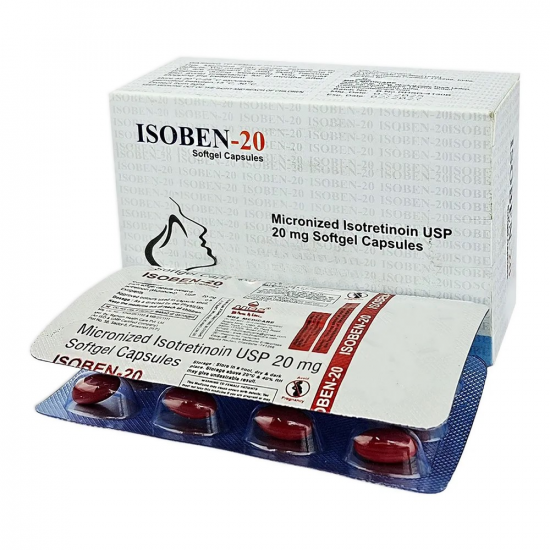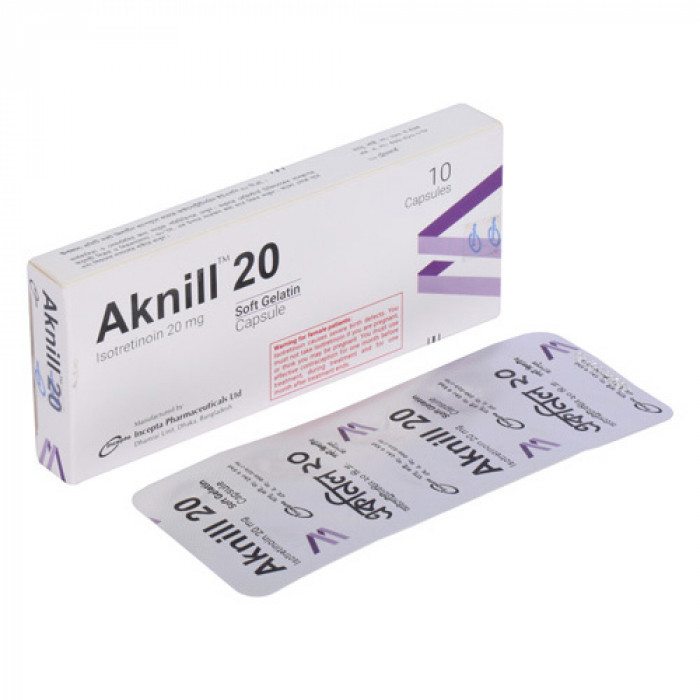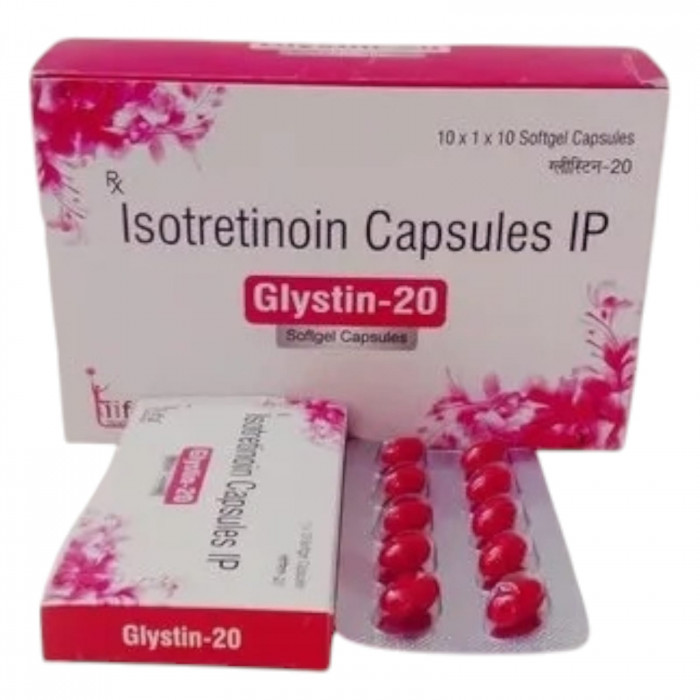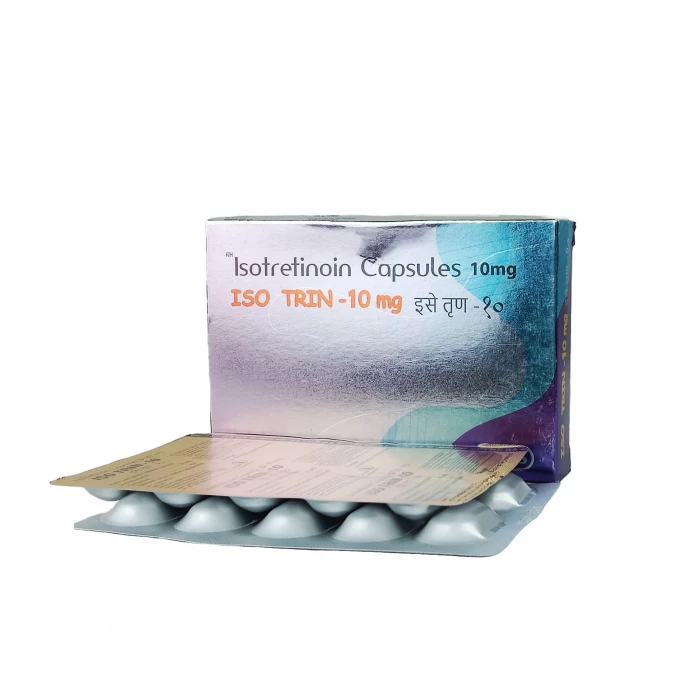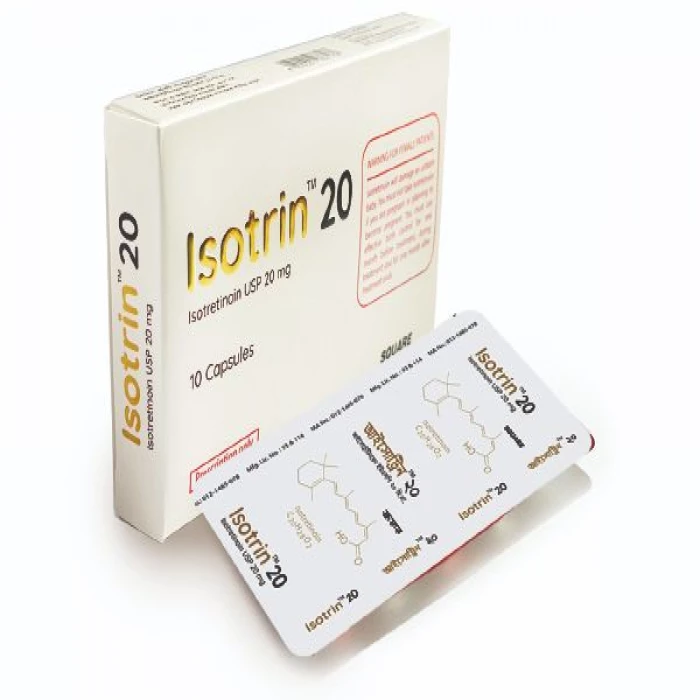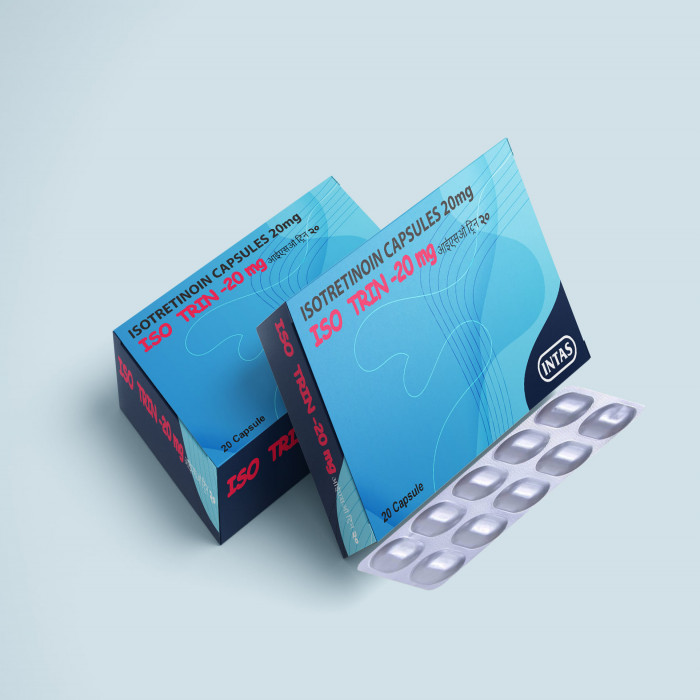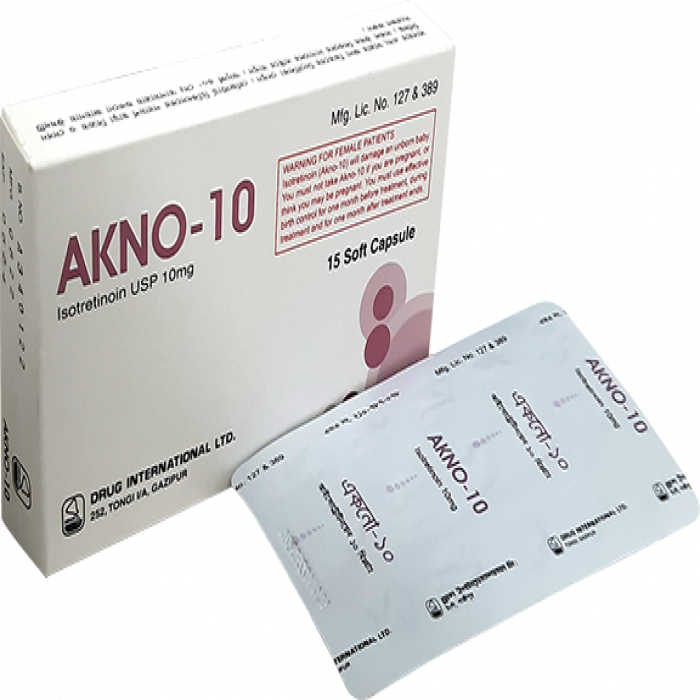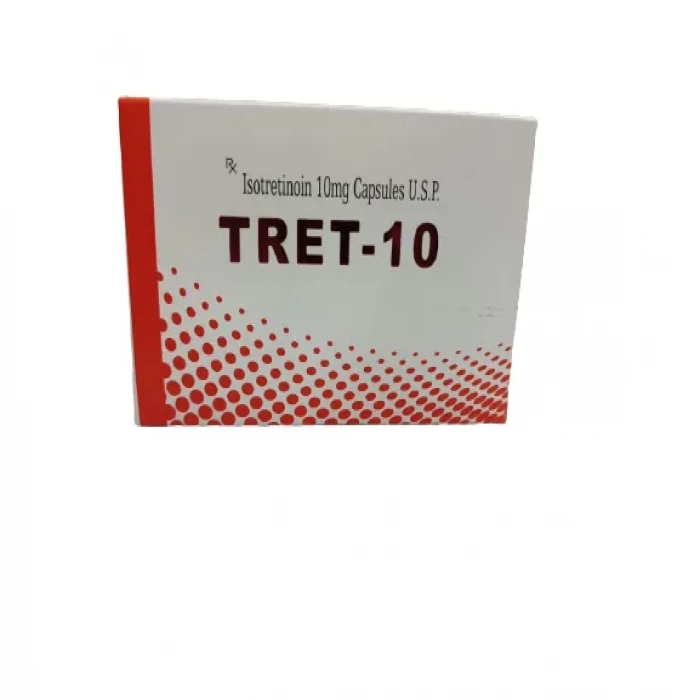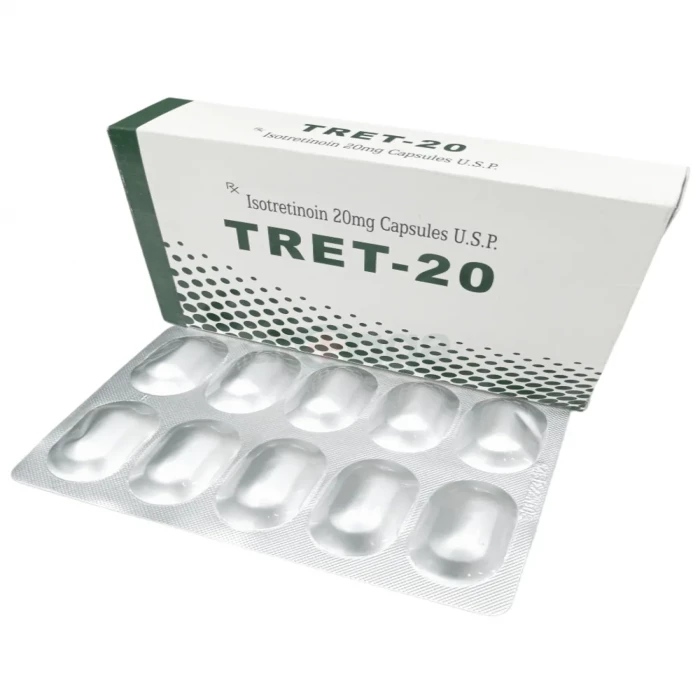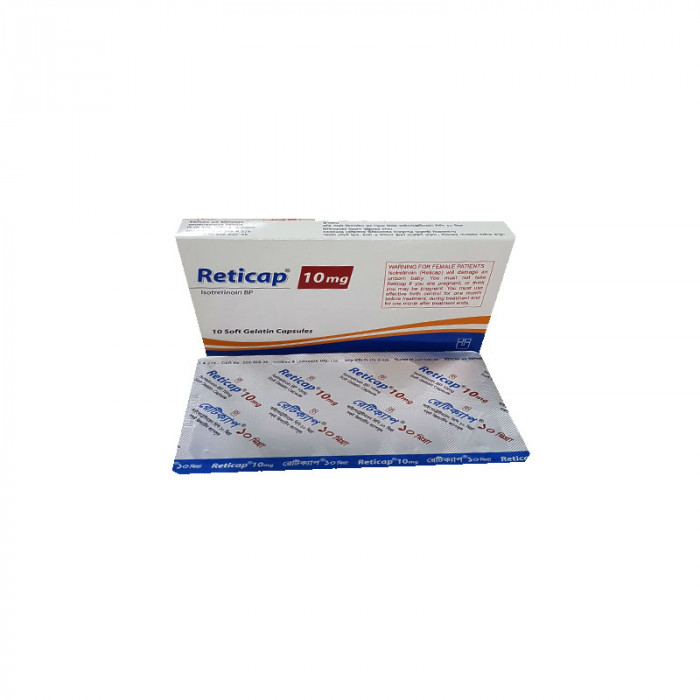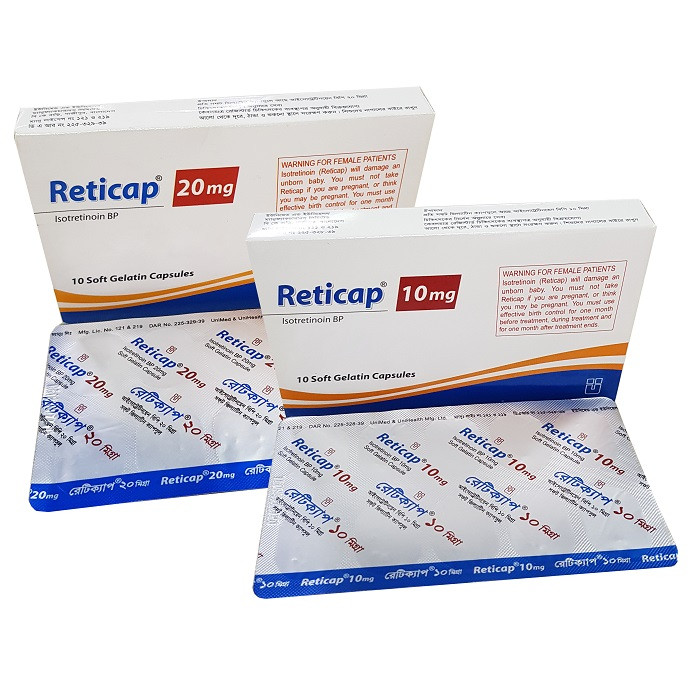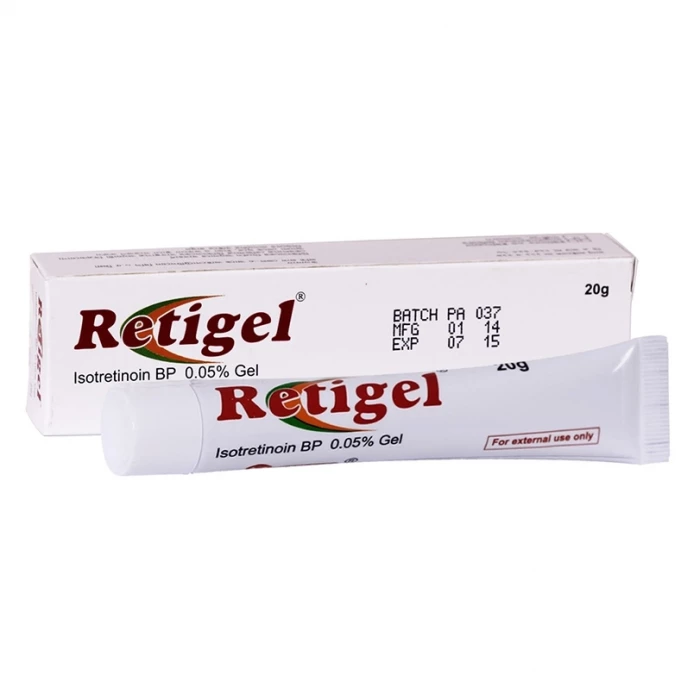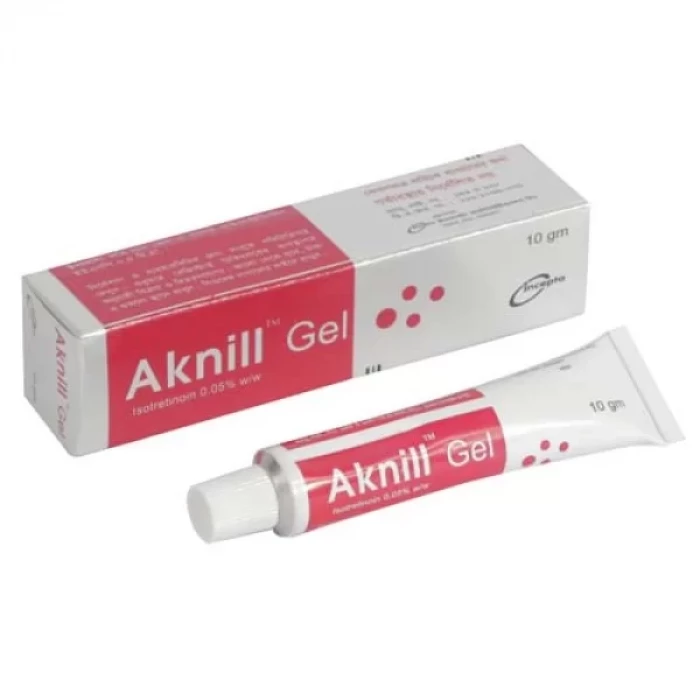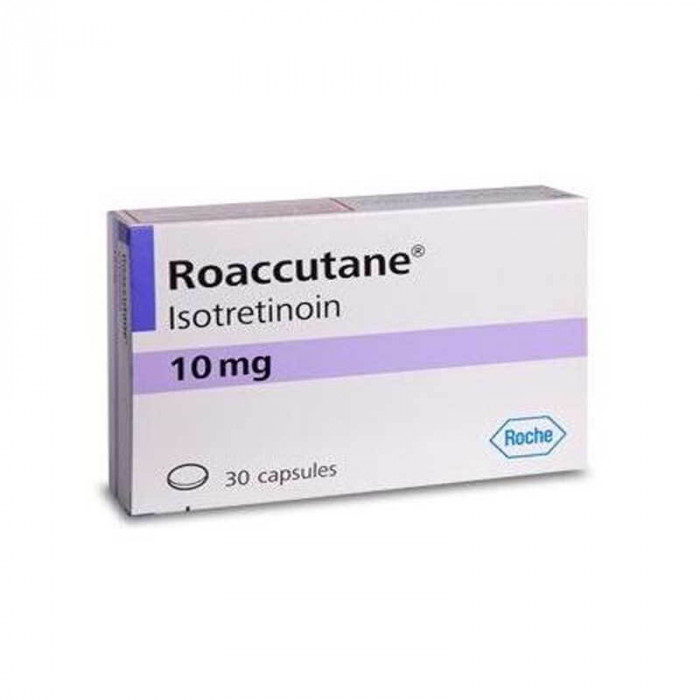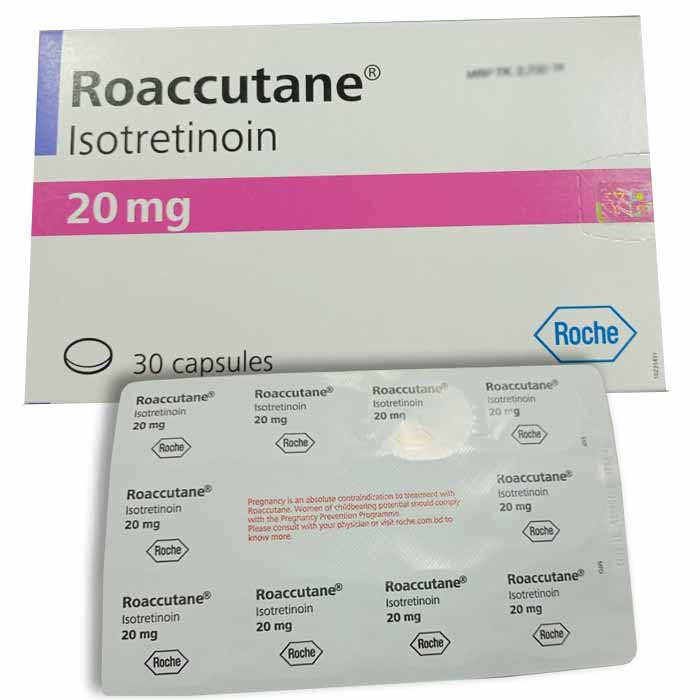
✔ 100% Authentic Product
👁️ Currently Viewing 14545
Roaccutane 20mg Capsule
Isotretinoin: Powerful Acne Relief
Indicated for severe, stubborn nodular acne, Isotretinoin tackles inflammatory lesions over 5 mm in diameter, which can turn suppurative or hemorrhagic. While its potent effects are tempered by significant adverse events, Isotretinoin is reserved for those unresponsive to standard treatments, including antibiotics. However, it's essential for female patients not to be pregnant due to the risk of severe birth defects.
Notably, many experience lasting remission after just one 15–20-week course. A second round shouldn't commence until at least 8 weeks after the initial treatment. Although re-treatment timing isn't set for those with ongoing bone development, Isotretinoin in Roaccutane 20mg Capsule, a vitamin A derivative, diminishes sebum production by reducing sebaceous gland size and activity. This clears pores and banishes acne-causing bacteria.
Discount
Price: ৳ 1,109
MRP:
৳
1132
2%
Off

100% Genuine Products, Guaranteed

Safe & Secure Payments, Always

Fast, Secure & Efficient Delivery

Proper Packaging
 Cash on Delivery - All over Bangladesh
Cash on Delivery - All over Bangladesh Regular Delivery - 12-24 Hours, Dhaka City* Charge Tk.39-59
Regular Delivery - 12-24 Hours, Dhaka City* Charge Tk.39-59 Regular Delivery - 24-48 Hours, Other Cities* Charge Tk.99-110
Regular Delivery - 24-48 Hours, Other Cities* Charge Tk.99-110
🌙 রমযান অফার 🌙
 ফ্রি ডেলিভারিঃ - ৭৯৯ টাকা+ অর্ডারে, ঢাকা
শহরে
ফ্রি ডেলিভারিঃ - ৭৯৯ টাকা+ অর্ডারে, ঢাকা
শহরে ফ্রি ডেলিভারিঃ - ২৭৯৯ টাকা+ অর্ডারে, ঢাকার
বাহিরে
ফ্রি ডেলিভারিঃ - ২৭৯৯ টাকা+ অর্ডারে, ঢাকার
বাহিরে
📲 মোবাইল অ্যাপ অর্ডারে সাশ্রয় বেশী
-
Google Play Store থেকে ডাউনলোড
-
Apple Store থেকে ডাউনলোড
100% Genuine Products, Guaranteed
Safe & Secure Payments, Always
Fast, Secure & Efficient Delivery
Proper Packaging
 Cash on Delivery - All over Bangladesh
Cash on Delivery - All over Bangladesh Regular Delivery - 12-24 Hours, Dhaka City* Charge Tk.39-59
Regular Delivery - 12-24 Hours, Dhaka City* Charge Tk.39-59 Regular Delivery - 24-48 Hours, Other Cities* Charge Tk.99-110
Regular Delivery - 24-48 Hours, Other Cities* Charge Tk.99-110 ফ্রি ডেলিভারিঃ - ৭৯৯ টাকা+ অর্ডারে, ঢাকা
শহরে
ফ্রি ডেলিভারিঃ - ৭৯৯ টাকা+ অর্ডারে, ঢাকা
শহরে ফ্রি ডেলিভারিঃ - ২৭৯৯ টাকা+ অর্ডারে, ঢাকার
বাহিরে
ফ্রি ডেলিভারিঃ - ২৭৯৯ টাকা+ অর্ডারে, ঢাকার
বাহিরে- Google Play Store থেকে ডাউনলোড
- Apple Store থেকে ডাউনলোড
🌙 রমযান অফার 🌙
📲 মোবাইল অ্যাপ অর্ডারে সাশ্রয় বেশী
✅ Description:
- Roaccutane 20mg Capsule includes isotretinoin, a medication from the class of drugs known as retinoids. It is used to treat severe forms of acne in adults and kids (who are older than 12) that have not improved after receiving other anti-acne medications, including nodular acne, conglobate acne, and acne that may leave permanent scars. Acne is an inflammatory skin ailment that causes sores, greasy skin, nodular lesions, and other symptoms on the chest, back, and face.
- Your doctor may perform specific blood tests and pregnancy tests while you are receiving treatment from Roaccutane 20mg Capsule, and a skin doctor will be in charge of you. You will be told to cut back on your vigorous physical activities. Make sure you wear high-protection sunscreen before going outside in the sun.
- Avoid using a sunlamp or a sunbed or getting too much sun. When using Roaccutane 20mg Capsule, avoid drinking alcohol as it may have negative side effects. Don't get cosmetic treatments done while using Roaccutane 20mg Capsule or at least wait at least six months after discontinuing it. Also, don't give blood while taking Roaccutane 20mg Capsule.
- Patients with liver or renal problems, hyperlipidemia (high blood lipid levels), or high levels of vitamin A are not advised to take Roaccutane 20mg Capsule. Patients who have or have had a mental illness, family history of mental illness, asthma, diabetes, heart issues, bone problems such as osteoporosis, or eating disorders should use Roaccutane 20mg Capsule with caution.
- Consult your doctor for guidance before using Roaccutane 20mg Capsule if you are pregnant, planning a pregnancy, breastfeeding, or if you have children under the age of 12. Patients who are old should use Roaccutane 20mg Capsule with care. (65 years and older).
Safety Advices

Alcohol
CAUTION
Caution is advised when consuming alcohol with Roaccutane 20mg Capsule. Please consult your doctor.

Pregnancy
UNSAFE
The use of Roaccutane 20mg Capsule in expectant mothers and those planning pregnancies is not advised. If you become pregnant while taking Roaccutane 20mg Capsule, tell your doctor right away. Given that some medication may remain to be in your system one month after discontinuing Roaccutane 20mg Capsule therapy, becoming pregnant is not advised. Before using it, speak with your doctor.
Prior to starting Roaccutane 20mg Capsule, during therapy, and for a month after, contraception must be utilized. Consult your doctor about the best forms of contraception.

Breastfeeding
UNSAFE
Roaccutane 20mg Capsule is not recommended for use in breastfeeding women as it may pass through breast milk. Consult your doctor before taking it.

Driving
CAUTION
Do not drive or operate machinery if you experience dizziness, drowsiness, or decreased night vision after taking Roaccutane 20mg Capsule

Kidney
CONSULT YOUR DOCTOR
Roaccutane 20mg Capsule should be used with caution in patients with kidney problems. Consult your doctor before taking it.

Liver
CONSULT YOUR DOCTOR
Roaccutane 20mg Capsule is not recommended for use in patients with liver disease. Consult your doctor before taking it.
✔️ Uses of Roaccutane 20mg Capsule
- Treatment of Acne
✔️ How Roaccutane 20 works
A synthetic version of vitamin A called Roaccutane 20 is used to treat a severe type of acne. By lowering sebaceous gland activity and size, Roaccutane 20 decreases sebum (the skin's natural oil) production on the skin's surface. Thereby unblocking pores and killing acne-causing bacteria. Additionally, Roaccutane 20 minimizes cutaneous edema.
✔️ Side effects of Roaccutane 20
- Dry skin
- Changes in skin color
- Bleeding from nose
- Scaling, burning, redness, and swelling of the skin
- Burning, dry and itchy eyes
- Chapped lips
- Bleeding or swollen gums
- Changes in the nail color
- Hair loss
- Sweating
- Ringing or buzzing in the ears
✔️ What if you forget to take Roaccutane 20 or overdose it?
- If you miss a dose of Roaccutane 20, take it as soon as possible. However, if it is almost time for your next dose, skip the missed dose and go back to your regular schedule. Do not double the dose.
- If anybody, including you, accidentally consumes too much Roaccutane 20mg Capsule, call your doctor right away or go to the nearest hospital. Severe headache, stomach discomfort, nausea, dizziness, facial redness, vomiting, somnolence, irritability, and itching are all signs of a Roaccutane 20mg Capsule overdose.
✔️ Quick Suggestions:
- Do regular hair wash and avoid contact of hair with the face.
- While using this medication, stay away from facial waxing and laser therapy since it weakens your skin.
- Tetracycline should not be used since it may decrease the action of Roaccutane 20.
- Even if it doesn't cure acne, regular exercise can elevate your mood and boost your self-esteem. After working out, take a shower right away because perspiration can aggravate pimples.
- Avoid being in the sun if you're taking Roaccutane 20mg Capsule since it might make your skin more sensitive to the sun and lead to sunburn. When walking outside, wear UV protection apparel and apply sunscreen to avoid getting sunburned.
- Before going to bed, fully remove your makeup. It could result in dry mouth, lips, and eyes. Use a moisturizer, drink a lot of water, and stay away from using contact lenses. If it affects you, let your doctor know.
✔️ Indications of Roaccutane 20mg Capsule
Isotretinoin is an ingredient in the medication Roaccutane 20mg Capsule. It is a vitamin A derivative that occurs naturally. This medication is used to treat nodular acne, a severe form of acne marked by big, painful, inflammatory lesions deep beneath the skin. It works by inhibiting the creation of a material called sebum, which can lead to acne or pimples, in the skin glands. Additionally, it has anti-inflammatory properties that lessen acne-related redness and swelling.
✔️ Pharmacology
Cell differentiation, cell survival, and apoptosis are all impacted by isotretinoin's actions. Through these processes, sebum production is decreased, limiting pore plugging and the development of acne-causing bacteria. Both isotretinoin and 4oxoisotretinoin dramatically reduce the production of sebum. Retinol-binding proteins (RBPs) and nuclear retinoic acid receptors have little to no affinity for isotretinoin. (RARs). Tretinoin and 4oxotretinoin bind to the RAR receptor, and it is assumed that this interaction contributes to isotretinoin's efficacy in the treatment of acne. Sebum production is reduced as a result of isotretinoin's induction of serum cell death. Isotretinoin also lessens the development of acne by decreasing hyperkeratosis through a process that is unclear. Although isotretinoin doesn't directly kill bacteria, it does lower the size of the sebaceous ducts and alter the microenvironment so that acne-causing bacteria have a harder time adapting. In order to minimize inflammation, it can also strengthen the immune system and alter the chemistry of monocytes.
✔️ Dosage & Administrations of Roaccutane 20mg Capsule
- Adults, including teenagers and seniors: The recommended starting dose for isotretinoin treatment is 0.5 mg/kg per day. Isotretinoin's therapeutic response and certain side effects are dose-related and patient-specific. Individual dose adjustments are required during therapy as a result. The dosage varies from 0.5 to 1.0 mg/kg per day for the majority of people. The total dose delivered has a stronger correlation with long-term remission and recurrence rates than treatment duration or daily dose. No discernible extra benefit may be anticipated at a cumulative treatment dosage of 120–150 mg/kg, according to research. The specific daily dose will determine how long the therapy will last. Usually, a 16–24 week treatment program is enough to induce remission. In the majority of individuals, a single treatment session is sufficient to completely clear the acne. A second round of isotretinoin therapy with the same daily dose and cumulative treatment dose may be considered in the case of a clear recurrence. A subsequent course of therapy shouldn't be considered until at least this time period has passed because more acne improvement can be seen up to 8 weeks following treatment termination.
- Patients with severe renal insufficiency: Treatment should be begun at a lower dose (for example, 10 mg/day) in patients with severe renal insufficiency. The dose should then be raised until it reaches the patient's maximum tolerated dose, which is up to 1 mg/kg/day.
- Due to a lack of information on its efficacy and safety, isotretinoin is not suggested for the treatment of prepubertal acne in kids younger than 12 years old.
- Patients who exhibit extreme sensitivity to the appropriate dose may have their treatment prolonged at a lower dose, which may lengthen their therapy and increase their risk of recurrence. In these individuals, the dosage should often be sustained at the highest tolerable dose in order to attain the most effective achievable.
- Once or twice a day, the capsules should be taken with meals. Only doctors who have experience using systemic retinoids to treat severe acne and who are fully aware of the dangers of isotretinoin therapy and the necessity for monitoring should prescribe or supervise the use of isotretinoin.
✔️ Interaction
Anticonvulsants (phenytoin), antibiotics (doxycycline, demeclocycline, minocycline, oxytetracycline, tetracycline), and vitamins may interact with Roaccutane 20mg Capsule. (vitamin A).
Use caution when using St. John's Wort, a herbal supplement used to treat depression, with Roaccutane 20mg Capsule since it can lessen the efficacy of hormonal contraceptives and increase the chance of pregnancy.
Before taking Roaccutane 20mg Capsule, consult your doctor if you have any of the following conditions: asthma, diabetes, liver or heart disease, hypervitaminosis A (high levels of vitamin A), weak bones, osteoporosis (bone loss), anorexia nervosa (an eating disorder where people eat too little), any mental conditions like psychosis (loss of contact with reality), or depression.
✔️ Contraindications
Unless all conditions for a pregnancy prevention program are satisfied, this medication is contraindicated in women who are or may become pregnant. Patients who have a history of isotretinoin or any of the excipient sensitivities should not use isotretinoin. Patients receiving concurrent tetracycline therapy and having a hepatic impairment, abnormally high blood lipid levels, or hypervitaminosis A are also not advised to use isotretinoin.
Unless the following pregnancy prevention program requirements are completed, this medication is contraindicated in women who are or may become pregnant. Topical treatment. She is aware of the teratogenic potential. She is aware of the necessity for strict follow-up appointments every month. She recognizes and accepts the necessity of using effective contraception for the whole month prior to beginning treatment, throughout treatment, and for the full month after treatment.
It is recommended to utilize a barrier approach together with at least one and ideally two other methods of contraception. Even if she suffers amenorrhea, she should nevertheless heed all recommendations for reliable birth control options. She must be able to use reliable contraception consistently. She is aware of the potential negative effects of pregnancy and the urgency of seeking immediate therapy if there is a chance of becoming pregnant. She acknowledges the requirement and consents to take a pregnancy test before, throughout, and five weeks following the end of therapy. She acknowledges that she is aware of the risks and protective measures associated with using isotretinoin.
Except in cases where the prescriber feels strongly that there is no danger of pregnancy, these requirements also apply to women who are not actively engaged in sexual activity. Prescribers must make sure that patients fulfill the aforementioned pregnancy prevention requirements, including ensuring that they are informed. The patient is aware of the anticipated circumstances. The patient has used effective contraception for at least one month before commencing therapy, for the course of treatment, and for at least one month following treatment. Preferably, the patient has utilized two effective methods of contraception. The therapy. pregnancy tests that came back negative prior to the start of the therapy, throughout it, and five weeks later. Pregnancy test dates and outcomes need to be documented.
✔️ Pregnancy & Lactation
Treatment with isotretinoin is absolutely contraindicated during pregnancy. There is a chance that the fetus will have extremely serious birth abnormalities if a pregnancy develops despite these measures either during the isotretinoin therapy or in the month that follows. Fetal anomalies linked to isotretinoin exposure include cardiovascular abnormalities (conjunctival malformations like tetralogy of Fallot, transposition of the great vessels, septal abnormalities), facial dysmorphia, cleft palate, external ear abnormalities (micronodular), external auditory tube abnormalities (no external ear, small or absent external auditory tube), and central nervous system abnormalities (hydrocephalus, cerebellar malformation/abnormal Additionally rising is the rate of spontaneous abortions. If an expectant patient is receiving isotretinoin therapy, the medication should be stopped and the patient should be directed to a teratologist or expert for evaluation and guidance. Since isotretinoin is lipophilic, it quickly enters breast milk. The use of isotretinoin in nursing women is not advised due to the possibility of harmful consequences in newborns exposed to breast milk.
✔️ Precautions & Warnings
- If you are expecting or nursing a newborn, you should not use Roaccutane 20mg Capsule since it might harm the child.
- To evaluate liver function before and throughout treatment with Roaccutane 20mg Capsule, regular blood tests are advised.
- While using Roaccutane 20mg Capsule and for one month after quitting them, avoid giving blood.
- Squeezing, popping, or picking at areas might make them worse and leave lifelong scars.
- Please see a doctor if you experience depression or have any suicidal thoughts while taking Roaccutane 20mg Capsule or after ending your Roaccutane 20mg Capsule medication.
- Avoid being in the sun if you're taking Roaccutane 20mg Capsule since it might make your skin more sensitive to the sun and lead to sunburn.
- When walking outside, wear UV protection apparel and apply sunscreen to avoid getting sunburned.
- While using Roaccutane 20mg Capsule and for at least six months after discontinuing therapy, avoid having any cosmetic operations done as this may increase the risk of scarring.
- Before taking Roaccutane 20mg Capsule, let your doctor know if you have any of the following conditions: asthma, diabetes, hypervitaminosis A (high levels of vitamin A), liver or heart issues, weak bones, osteoporosis (bone loss), anorexia nervosa (an eating disorder where people eat too little), any mental conditions like psychosis (loss of contact with reality), or depression.
✔️ Storage Conditions
Keep below 30°C temperature, away from light & moisture. Keep out of the reach of children.
⚠️Disclaimer:
At ePharma, we’re committed to providing accurate and accessible health information. However, all content is intended for informational purposes only and should not replace medical advice from a qualified physician. Please consult your healthcare provider for personalized guidance. We aim to support, not substitute, the doctor-patient relationship.




